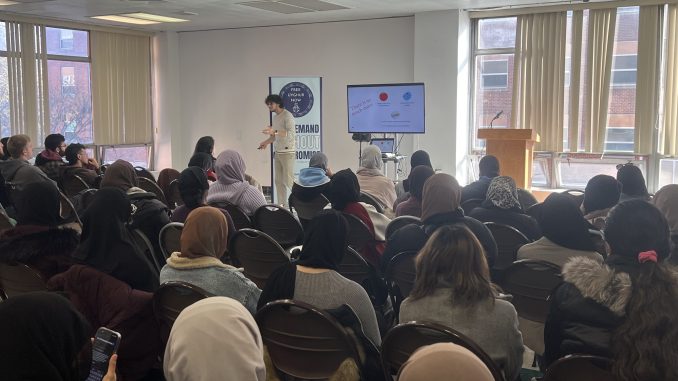
By Kate Dempsey
There are brands and companies that Americans cannot seem to get enough of: Nike, Adidas, Apple, Microsoft, The North Face, Zara, and many other major companies that produce the world’s products. What may seem like harmless consumership and purchases has a more sinister background because the origin of such products starts with Uyghur forced labor.
The Uyghur people reside in the Xinjiang province in northwestern China, an area known for its abundant coal reserves and connections to the Middle East and eastern parts of Europe. Uyghurs are a Turkic ethnic group who practice Islam and speak the Uyghur language. Since 2014, the Chinese government under the Chinese Communist Party has held Uyghurs in “re-education camps,” claiming these detainments are to prevent terrorist attacks and uprisings, and to provide formal “training” to the mostly rural population.
Many governments and non-governmental organizations around the world believe that China is committing cultural genocide towards this religious group in a country that is strictly atheist. Control of the population would also mean eliminating the threat of economic and territorial separatism by claiming to be preventing “religious extremism,” according to the Council on Foreign Relations.
At the Uyghur Genocide Awareness Discussion held at Brooklyn College on Tuesday, Nov. 17, Uyghur activists Jewher Ilham and Kabir Qurban spoke about what their people are experiencing and ways to help them. For many Muslim students at the college, coming to the talk was a means of supporting and raising awareness about what is happening to their fellow Muslims, highlighting that this is not an activism “trend” to be forgotten about.
“I feel like every time something like this happens, people like to focus on it for a month and then disappear out of it. I feel like this is an awareness that we should all focus on, not just for that one month and call it a day,” said Besan, a junior at BC who did not want to share their last name.
The event was sponsored by the Bridges for Yemen club, Brooklyn College Historical Society, BC Muslims Giving Back, and the Brooklyn College Islamic Society and Muslim Women’s Educational Initiative, in conjunction with the student-led coalition Free Uyghur Now.
Throughout the discussion at the Student Center, Uyghur activists shared their personal stories of life in the Xinjiang region and the stories of other Uyghurs living there. For Jewher Ilham, the beginning of the Uyghur detainment brought about changes that permeated her life.
“When we go to the shopping mall, when we go to the campus, we are followed by policemen. Our phone calls were bugged,” Ilham said. “At the end of a phone call, instead of saying goodbye we say, ‘Allah [the Arabic word for ‘God’] wish you safe, Allah wish you health, Allah wish you peace.’ But now what I hear is, ‘Xi Jingping wish you peace, wish you health.’”
Ilham, who recently released her biographical book “Because I Have To: The Path to Survival, The Uyghur Struggle,” recalled the moment her father was detained before her very eyes on Feb. 2, 2013. As they were in the airport about to leave the country, Ilham’s father told her to go on as the authorities detained him. She has not seen him since.
For Uyghurs, they have witnessed their families being torn apart from the detainment, seeing relatives and friends arrested for even saying the Arabic greeting “As-Salaamu Alaykum” out in public, which translates to “peace be upon you.”
Many do not know if their loved ones are still alive since they have seemingly disappeared from existence. As Ilham described, Uyghurs would come home and find nobody there, leaving many to wonder, “Where did everybody go?” For others, the horrible truth on what happened had to be concealed in order to stay safe.
“My grandmother who we had to lie to for years because she wanted to speak to her daughter and we told her that, ‘Hey, you know, there’s just this situation with the phone line, you just can’t call,’” Qurban said. “For years we would lie to her and not let her know that her daughter has passed away because of the fear that she would try and go to visit her daughter.”
Qurban discussed many ways to sustain Uyghur activism and avoid being complicit in forced labor: continue to educate yourself, find allies, join student campaigns, and research the brands you wear. Raising awareness about the plight of Uyghurs can only be reached through global solidarity, Qurban explained, recognizing that this problem is not just a Uyghur or Muslim problem, but something everyone needs to be concerned about.
“You do not have to be a Uyghur to understand how Uyghurs feel, you don’t have to be a part of a specific ethnicity or population to help the other side of the world,” Fehim Hoti, secretary of the Islamic Society, said. “You just need to be a human being.”
